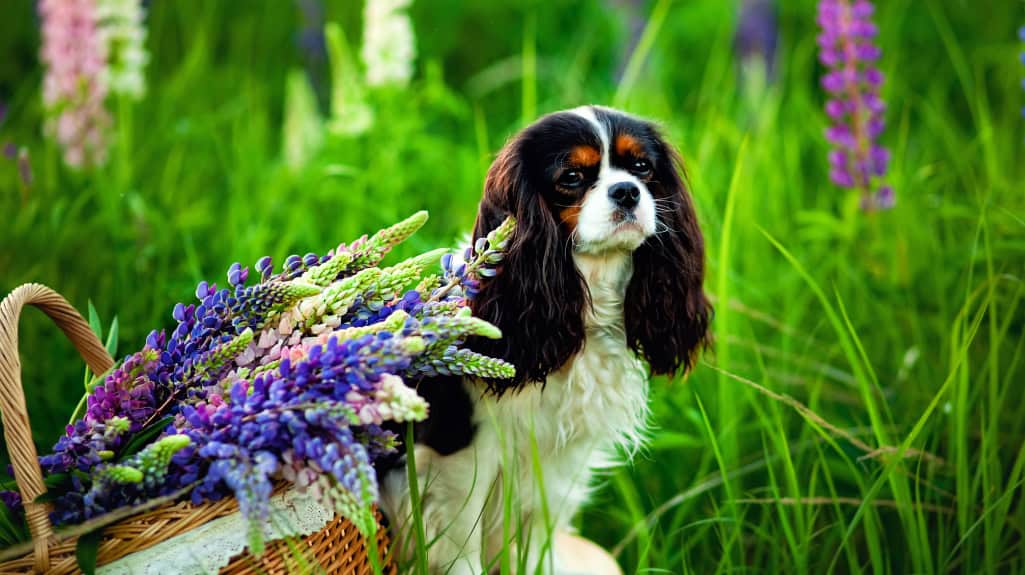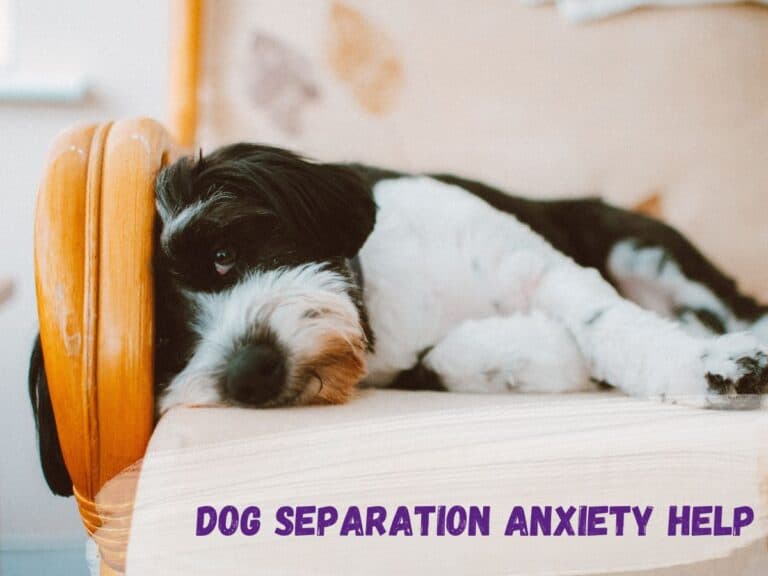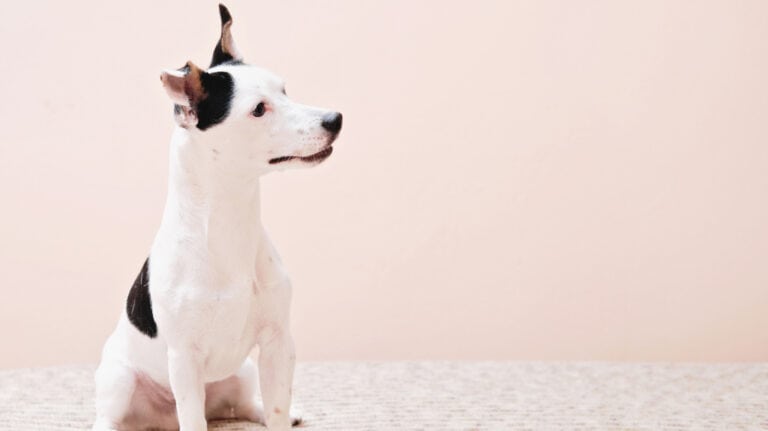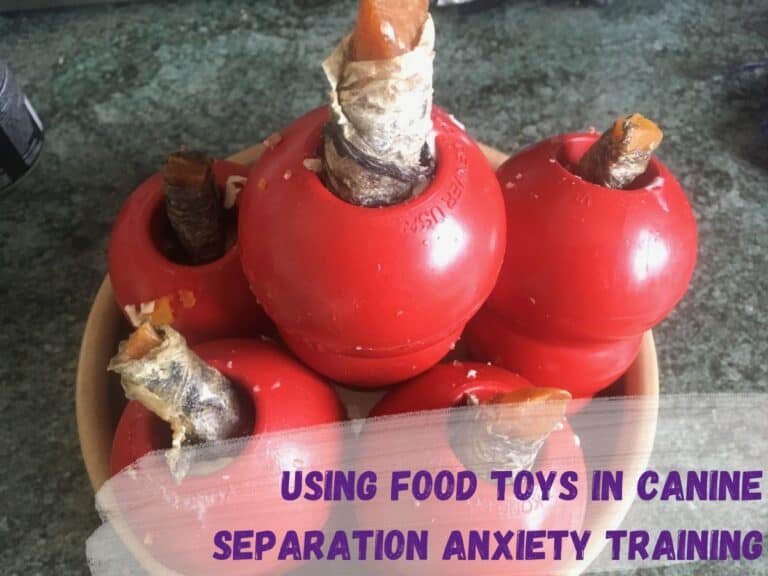Herbs for Dog Separation Anxiety
The Pet Coach features affiliate links and participates in the Amazon Services LLC Associates Program. If you choose to make a purchase through one of these Amazon links, I may earn a small commission—at no additional cost to you. These affiliate earnings help support the website and allow me to continue providing free content for pet parents. For more details, please see my disclosure policy.
Herbal remedies often come up as a solution for canine separation anxiety, and they definitely fall into the ‘can’t hurt, might help’ category of complementary treatments. If you’re struggling to help your dog cope without you being with them all the time, then you’re not alone. Many dog owners face this challenge and are searching for more natural health solution, before they go straight to prescription medication.
In this article, we’ll take a look at some herbs that can support a dog with separation related problems. By using natural remedies, you can provide your dog with relief, reduce nervousness and promote a sense of calm when you’re not around.
As dog behaviour professionals, we generally use behaviour modification alongside medication (both prescribed and non-prescribed) to help improve our dogs’ lives – these products help to give us a larger window of learning, and allow your dog to cope better with our treatment plan. To get help with your dog’s separation difficulties, book a consult today and let’s talk!
Note: I’m a Certified Companion Animal Behaviourist and Dog Trainer, not a Vet or Canine Herbalist. For a consult on herbs to support your dog, I recommend speaking with The Possible Canine.
Understanding Canine Separation Anxiety
Separation anxiety in dogs is a common and often misunderstood condition. The root causes can vary, including your dog panicking at social isolation and lack of experience being alone, past traumas, or significant changes in routine or environment.
Identifying separation anxiety vs isolation distress, a bored dog vs one who is frustrated and then panicking, involves observing specific behaviours and body language. Watch for pacing, restlessness, escape attempts, and excessive salivation when you’re preparing to leave.
Early intervention is crucial, as it can prevent the development of more severe anxiety and support your dog’s emotional well-being.
If you suspect your dog has separation anxiety, learn more in my article on separation anxiety help, or view the main separation anxiety services page to see how I can help.
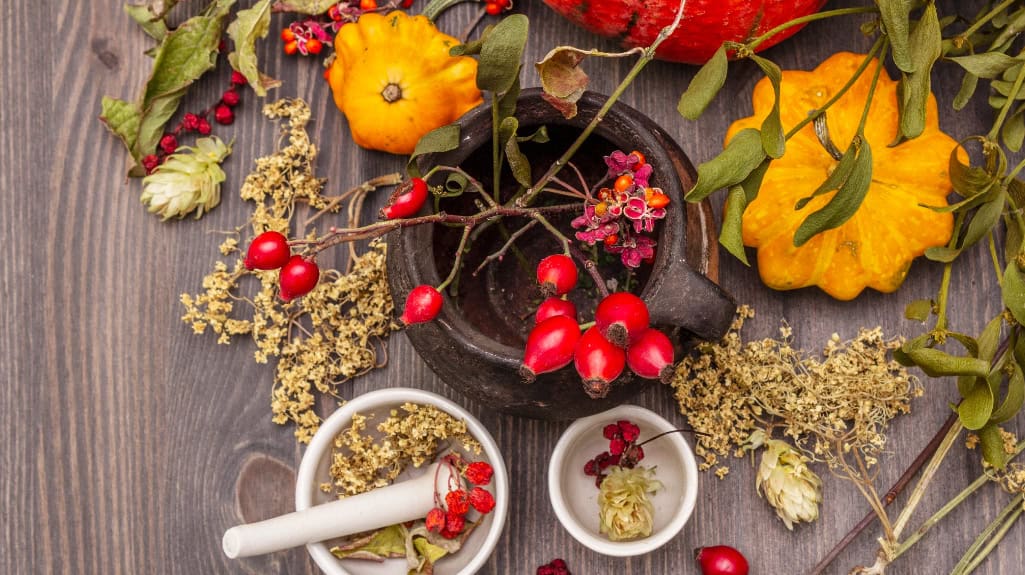
Top Herbs for Calming Dogs
Nature’s medicine cabinet offers several powerful herbs that can help calm your anxious dog, don’t be fooled that because these are herbs, they’re less potent than prescription products, they can have powerful effects!
Chamomile, renowned for its mild sedative properties, can significantly reduce stress symptoms in dogs. It’s an excellent choice for calming your pet during stressful situations, such as when you’re preparing to leave the house.
Valerian root stands out as a potent anxiety-reducer, inhibiting GABA breakdown in the brain to promote a soothing effect. This herb can be particularly effective in alleviating separation anxiety symptoms.
Passionflower, a powerful nervine that provides relaxation and calming effects by increasing GABA. It’s especially beneficial for dogs struggling with separation anxiety, helping to ease their distress when left alone.
For maximum impact, consider combining these herbs. The synergistic effects of valerian, chamomile, and passionflower can offer a comprehensive solution for your dog’s anxiety.
Consistent use of this herbal blend, coupled with behavioural techniques, may lead to improved emotional balance and reduced anxiety symptoms over time. Remember, patience is key – you’re retraining your dog’s emotional responses, which doesn’t happen overnight.
Chamomile: Nature’s Tranquilliser
Chamomile (Matricaria chamomilla) is not just for your tea! That’s right, Chamomile is among nature’s most potent herbal remedies, and stands out as a gentle yet effective solution for dogs struggling with separation anxiety. This remarkable herb contains apigenin, a powerful flavonoid antioxidant that binds to specific brain receptors, promoting relaxation and reducing anxiety levels in your canine companion.
You’ll find Chamomile particularly versatile, as it can be administered in various forms. Whether you choose to brew it as a tea, use it as a tincture, or mix dried chamomile with your dog’s food, chamomile can significantly alleviate stress-related behaviours.
What’s more, Chamomile’s safety profile makes it an attractive option for pet owners seeking natural alternatives. You can confidently incorporate it into a comprehensive separation anxiety treatment plan, often combining it with other natural remedies for enhanced
effectiveness.
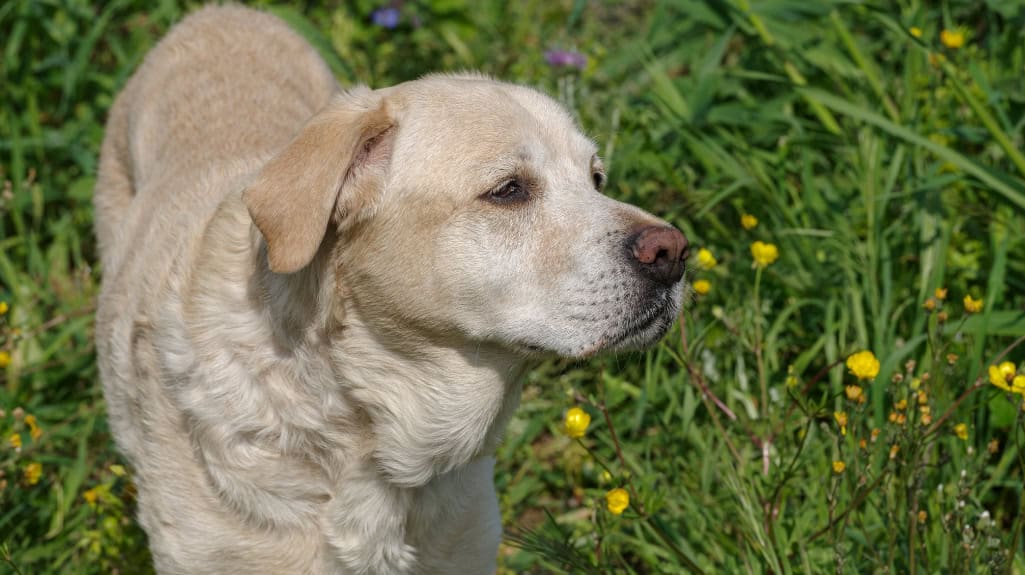
Valerian Root’s Soothing Properties
Valerian Root’s (Valeriana officinalis) reputation as a natural anxiety-reliever makes it a go-to option for dog owners battling separation anxiety. This powerful herb works by inhibiting the breakdown of GABA, a neurotransmitter responsible for promoting relaxation. By increasing GABA levels, valerian root helps your dog feel more at ease when left alone, addressing the root cause of separation anxiety.
You’ll find Valerian available in various forms, including herbal tablets and tinctures, allowing you to choose the most suitable option for your pet. Valerian is often combined with Scullcap in tablet form as a herbal blend to support dog anxiety.
For optimal results, you should administer Valerian Root consistently, over a period of time. Consider combining it with other calming herbs to enhance its effectiveness in reducing stress and helping to support your dog’s comfort at being home alone.
Passionflower for Anxious Pups
Passionflower (Passiflora incarnata) stands out as a powerful ally in the fight against canine separation anxiety. This remarkable herb has garnered attention for its ability to alleviate anxiety symptoms and promote better sleep in dogs. Its effectiveness stems from its capacity to enhance GABA activity in the brain, resulting in a calming effect that can significantly reduce your pup’s stress levels when you’re away.
You’ll find that passionflower’s potency is often amplified when combined with other soothing agents, creating a synergistic effect that maximises its anxiety-reducing properties.
While generally safe for canine consumption, it’s crucial to consult your veterinarian before incorporating passionflower into your dog’s regimen to ensure appropriate dosing and avoid potential interactions.
For seamless integration into your dog’s daily routine, passionflower is available in various forms, including tinctures and capsules. This versatility allows you to choose the most suitable option for your furry friend’s needs and preferences.
Administering Herbal Remedies Safely
When it comes to administering herbal remedies for your dog’s separation anxiety, safety should be your top priority. I would always recommend you speak with a Qualified Canine Herbalist or Holistic Veterinarian, before you start giving something to your dog.
They’ll ensure the chosen remedies are safe and appropriate for your dog’s specific needs and health conditions.
A professional should have you start with the correct dose for your dog’s weight, often quite low and gradually increase it while closely monitoring your dog’s response, and how it changes their mood and behaviour. This approach helps you avoid potential adverse effects and gauge the herb’s effectiveness.
SAFETY FIRST: Herbs are not automatically safe just because ‘they’re natural’ and you should be careful with their usage!
Consistency is key when using herbal remedies. Many natural products require time to build up in your dog’s system before exhibiting their full effects. Administer them regularly as directed for optimal results.
Be mindful of potential interactions between herbal remedies and any medications your dog may be taking. Always disclose all supplements to your veterinarian to ensure safe management and avoid complications.
Combining Herbs With Behavioural Techniques
When addressing separation anxiety in dogs, combining herbal remedies to help lower anxiety and provide emotional support, alongside behavioural modification techniques can significantly enhance your training progress.
By pairing calming herbs like valerian, chamomile, and passionflower with desensitisation and counter-conditioning methods, you can help to create a comprehensive approach to reducing nervous behaviour and anxiety symptoms in your dog.
You can also implement positive reinforcement training alongside herbal supplements to teach your dog new skills, increasing your dog’s behavioural repertoire and meet their breed specific needs, gives your dog confidence and fosters a more enriched environment.
To maximise effectiveness, talk to a Holistic Veterinarian or Certified Animal Behaviourist. They can help you determine the optimal combination of herbal remedies and behavioural help tailored to your dog’s specific needs.
This holistic method can lead to more sustainable improvements in your dog’s overall well-being and behaviour.
While herbs like chamomile, valerian root, and passionflower can work wonders when used correctly, you do need to be cautious and consider how they will change brain chemistry, often specific dog separation anxiety medication is a safer bet as it is so tried and tested, with a huge amount of clinical research behind it.
Don’t forget to combine these remedies with behavioural techniques for the best results. You can learn more in my articles on dog separation anxiety help or pre-departure cues in dog separation anxiety training?
Always consult your vet before starting any new treatment. With patience and consistency, you’ll help your dog feel more relaxed and secure when you’re away. Your pup’s peace of mind is worth the effort!
Get in touch and tell me about your dog today, as a CSAT and Certified Animal Behaviourist I’m happy to help.
